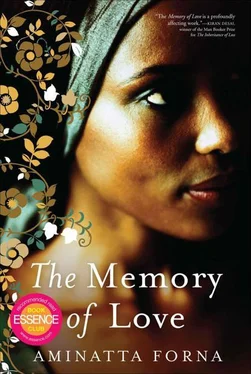They picnic on the rocks and then swim. Adrian feels the glow of the cool water enter him. The river is faster moving than it looks and they give in to the current, floating downstream on their backs and ending up in an eddy by the riverbank. They dry off in the sunlight. Adrian’s skin feels clean and smells sweet and faintly brackish. Abass plays with the empty beer bottles in a rock pool, half filling them with water and watching them bob on the surface. Two boys appear with home-made fishing rods and come over to stare at Adrian. After a few minutes Kai tells them to go away. They obey, wordlessly and without apparent resentment, and join Abass at his rock pool. Later, when Adrian goes to relieve himself behind a bush, they will follow him and at his insistence depart, repeating his words between themselves, Buggeroff, buggeroff .
Adrian watches Abass sitting hunched over his knees, absorbed in the tiny underwater world of the rock pool, feels a surge of tenderness for him and says, ‘He’s a lucky kid.’ Immediately he feels foolish, the absurdity of envying anybody here their luck, though somehow he does.
But Kai merely replies, ‘Yes, I know. I was just like him.’
‘In what way?’
‘We used to come here a lot. Actually, probably it was less than half a dozen times, but then, in a kid’s life, that’s a tradition, right? Six years, as much as you can remember. This one time we’d come after the rains, you should see how much water there is then. I tried to swim under the waterfall. I thought I’d find a secret cave. I nearly drowned. My mother gave me such a whipping.’
Adrian thinks of his own childhood. He would never have dared do such a thing. Not for the danger to himself, but for fear of disappointing his mother. He stands up.
‘Come on!’ he says. And plunges into the water.
It is after four when Kai says, ‘We’d better be going. It’s not a good idea to drive too much into the dark. There are some crazy drivers.’
They pack up and head back to the car. Kai reverses up the track. Old Faithful’s engine whines, the tyres spin on the gravel, but Kai doesn’t stop until he finds a place to execute a tight three-point turn. They pass through and over the same series of towns and bridges, this time with the sun on the other side of the road. The earth is redder now, the light softer. It fills Adrian with well-being, now after a week of illness, a week spent recovering, he feels ready to get back to work.
An hour and a half into the journey they make a detour into a town to find petrol. There is a queue, the petrol pump is hand-operated and slow. So while Kai waits, Adrian allows Abass to lead him towards a stall selling cassettes, where four speakers relay music so loudly it is distorted. Unperturbed, the boy peruses cassettes. Adrian moves away from the noise to a distance where he can still keep an eye on Abass. Around him are stalls displaying trainers, plastic kerosene containers, hats. On the far side of the square a taxi pulls over, the driver takes his fare from the passenger and opens the boot, releasing three handsome, deep-brown goats. The ground is dusty and strewn with paper, like a fairground at the end of the evening.
He recalls his father in the nursing home towards the end. Adrian had taken Kate with him on the visit and they had stopped at a funfair on the way. The lights, the cool October air, the noise. By contrast the atmosphere inside the nursing home: overheated, static, hushed. They had stayed for an hour, during which Adrian had been unable to work out truly whether his father remembered any of the events Adrian described or even knew who he was. At the end of the visit he had turned at the door to say goodbye and the old man had raised his hand, fingers closed around his palm, and held up a wavering thumb. At first Adrian hadn’t understood. And then he had seen it, the thumbs-up sign. It had once been their joke. There was a country somewhere in the world where the thumbs-up was the equivalent of the V sign. Where was that? Thailand? Iran? He’d read about it and told his father. Later his father had performed the gesture — emphatically — behind the back of a priggish waiter. By then the disease had already begun to strip his brain of cells, though none of them knew it yet. Adrian giggled into his Coke glass.
Watched by the stallholder, Abass is lingering over the cassettes in the manner of all small boys with no money of their own. Adrian decides to leave it a few minutes before he offers to buy one for him. Meanwhile he surveys the marketplace. He has no real idea of where they are.
Fifty yards away a woman and a young girl leave one of the stalls, and turn in his direction. The woman is tiny, the size of the girl. She is wearing a piece of light-coloured cloth wound around her body and over her head. The girl is wearing a cotton blouse and a denim skirt. Adrian watches them idly. The heat, the exertion of swimming, the beer, the recent illness have slowed him. Only when they are twenty yards from him does the realisation begin to trickle through his brain like a cold oil. The woman with the girl. The woman with the cloth covering her head, framing her face. It is Agnes.
Quickly he turns on his heel and returns to Abass. ‘Tell your uncle I’ll be two minutes.’ He holds up two fingers. Abass stares at him uncomprehendingly, his hands closed around a cassette. ‘Two minutes.’ Adrian turns to the stallholder, who inclines his head slowly in assent. Satisfied, Adrian sets off, walking quickly. Ahead of him he sees the two women turn down one of the streets off the square. He slows his walk and follows. From the end of the road he watches them climb the steps up to a house. The house is identical to all the others on the street: square, single-storey, with a deep verandah at the front, a concrete balustrade, stairs leading up from either side.
On the verandah of the house Agnes entered a man, dressed only in a pair of cotton trousers, sits upon an old car seat.
‘Hello,’ says Adrian.
‘Hello,’ the man answers. ‘What can I do for you?’ His English is excellent. If he is surprised to see Adrian it does not show.
Adrian gives his name, asks if the woman who came in is called Agnes.
‘She is Agnes, yes.’ The man rises and positions himself on the balustrade, the better to hear, it seems, only now he is leaning over Adrian. He is handsome, unsmiling, with even white teeth and heavy, slanted cheekbones. His hair is knotted into short dreadlocks. ‘What is your business with her?’
Adrian hesitates, unsure how to respond. He doesn’t want to appear uncooperative, on the other hand there is the matter of patient confidentiality.
‘I’m a doctor,’ he says.
‘Agnes is not sick.’ A statement.
‘Not exactly. I saw her some time ago. I just wanted to follow up. I didn’t manage to see her before she was discharged.’
The man is watching him closely, the eyes never leave Adrian’s face; his expression is indiscernible in the failing light. Adrian sees himself through the man’s eyes, a strange white man from off the street. Perhaps he shouldn’t have followed Agnes to her home, she had discharged herself. He just wants to talk to her. ‘It’ll take five minutes.’
The man eases himself off the balustrade. ‘You are a doctor, you say?’ He is still looking at Adrian, his speech is measured and deliberate, his manner unhurried.
‘That’s correct.’
‘One moment. Let me find her for you.’ He crosses to the door and enters the house, closing the door behind him. Adrian waits in the street. There are few passers-by, the day is over. In a short time it will be dark. Adrian hopes the young man is conveying the message accurately; for some reason he hesitates to trust him entirely, something in his manner. More curious about Adrian than concerned for Agnes. When after several more minutes the man doesn’t return, Adrian starts tentatively up the stairs. If Agnes sees him she’ll recognise him, he’s sure.
Читать дальше












